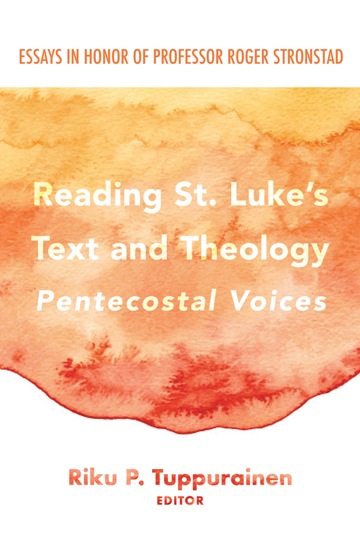Reading St. Luke’s Text and Theology: Pentecostal Voices
 Riku P. Tuppurainen, ed., Reading St. Luke’s Text and Theology: Pentecostal Voices (Eugene, OR: Pickwick Publications, 2019), xxxiii + 316 pages.
Riku P. Tuppurainen, ed., Reading St. Luke’s Text and Theology: Pentecostal Voices (Eugene, OR: Pickwick Publications, 2019), xxxiii + 316 pages.
The editor of this book, Dr. Riku P. Tuppurainen, Dean of Graduate Studies of Summit Pacific College in Abbotsford, BC (xii), has skillfully assembled a festschrift of “Essays in Honor of Professor Roger Stronstad” (T.p.) for Roger’s 75th Birthday. These essays are divided into four major sections: PART I—Roger Stronstad as Biblical Scholar, Pentecostal Theologian, and Educator (vii); II—Reading St. Luke’s Text: Hermeneutical Considerations; III—Reading St. Luke’s Theology: Pneumatological Ambiances; and, IV—Reading St. Luke’s Pneumatology with Other Texts. All 21 scholarly contributors of the book’s 22 chapters hold doctorates and because of their contacts over the years with the honoree knew him well enough to make personal references to him. Unfortunately, among the Pentecostal scholars who personally know him, not one of them is a Pentecostal woman academician. The contributors are scholars currently living in the United States, Canada, the United Kingdom, Belgium, or Australia.
The work consists of two bibliographies, one of which is a “Comprehensive Bibliography of Roger Stronstad’s Published Works” by Alford Deeley (xxix-xxxiii). He holds the Roger J. Stronstad Chair of Biblical Theology at Summit Pacific College. The other “Bibliography,” near the end of the book (265-290), precedes the Indexes. Besides Roger Stronstad, who has the most bibliographic entries in the festschrift, are the contributors Amos Yong, Veli-Matti Kärkkäinen, Robert P. Menzies, Craig S. Keener, Martin William Mittelstadt, and Rikki E. Watts, each with a comparatively large number of bibliographic sources.
The primary foci of the book are both biblical and pneumatological, reflected by the Old Testament (including the Septuagint) and by the New Testament. In addition, Old Testament apocryphal and Pseudepigraphic literature, other ancient Jewish writings, early Christian writings, and other ancient literature appear. Tongues speaking, pre- and post-Stronstad eras, socio-rhetorical criticism, postmodernism, ecclesiology, Charismatic ministries, missional pneumatology and prophetic learning are discussed. Although Lukan, Matthean, Markan, and Johannine theologies are presented, Pauline theology is limited to one specific and comparative essay: “What Does It Mean—According to the Book of Acts and the Letter to the Ephesians—to Be ‘Filled with’/’Full of’ the Holy Spirit?” This contribution is by Dr. Sven Soderlund, Professor Emeritus of Biblical Studies, Regent College, Vancouver, BC. Of all Scriptural passages selected for the basis of an essay to represent Pauline theology, arguably to be “Filled with” or “Full of” the Holy Spirit is one of the most important for Holy Spirit living. But considering the importance to Pentecostals of Pauline theology, particularly of I Corinthians 12-14, references to these chapters unfortunately include only 63 references to this Corinthian segment in the festschrift. Of further import to Pentecostals are spiritual gifts in Romans 12 that is limited to three references. Among the collected essays, Romans 8 has five references, but Romans 8:26-27 has only one reference pertaining to these verses.
Evident from his sources used, Dr. Craig S. Keener is to be commended for his depth of research evident in his essay, “Prayer for the Spirit in Luke 11:1-13.” Keener is F.M. and Ada Professor of New Testament at Asbury Theological Seminary in Wilmore, KY (xii). The range of references he uses in the essay displays his depth of research and is but a small reflection of his monumental 4-volume-4600 plus page work, Acts: An Exegetical Commentary (2012). In his essay, Keener goes far beyond Biblical references. These include Deuterocanonical and Pseudepigraphical sources. In addition, Jewish writings comprise the Babylonian, Mishnah and Tosefta Tractates; Targums; Rabbahs; the Qumran Rule of the Community and Josephus. Christian writings encompass Polycarp, Justin Martyr and Chrysostom. Other ancient writings are by Philo, Homer and Seneca.
Essays by Keener, and the other 20 contributors honoring the Rev. Dr. Roger J. Stronstad, will provide for an upcoming generation and future generations of Pentecostal scholars a host of topics and motifs for further research and discussion.
Reviewed by Laurence M. Van Kleek
Publisher’s page: https://wipfandstock.com/reading-st-luke-s-text-and-theology-pentecostal-voices.html
Preview: https://books.google.com/books?id=cRK4DwAAQBAJ


